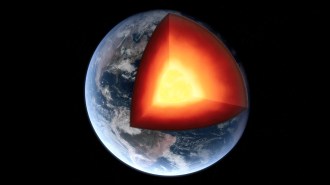Tiny organisms that lived in remote arctic lakes are adding evidence that large swaths of the Northern Hemisphere have been warming for many decades.

High-latitude lakes become dormant in winter when they gain a thick armor of ice or freeze solid, as some of the smaller lakes do. These aquatic ecosystems are particularly sensitive to climate change because even small temperature increases can lengthen the growing season for aquatic algae and the creatures that feed on them, says John P. Smol, a biologist at Queen’s University in Kingston, Ontario.
Smol and his colleagues studied 55 sediment cores taken from dozens of lakes in remote, unpopulated areas. Among other analyses, the researchers tallied the remains of aquatic organisms at various depths in each core. They considered water fleas, insect larvae, diatoms—microscopic algae with hard and often ornate silica shells—and other organisms.
The scientists found that ecosystems in many of the lakes they sampled began to change about 150 years ago. At many sites, the predominant types of diatom abruptly shifted from sediment-dwelling species to those that thrive in open water. Simultaneously, populations of water fleas and algae-eating insect larvae increased. The researchers report their findings in an upcoming Proceedings of the National Academy of Sciences.
Those ecological changes didn’t result from emigration, Smol says, because all the organisms found at each site in modern sediments had also lived there in previous centuries, but in different proportions. He and his colleagues speculate that a warming climate in recent decades has increased the average duration of open-water habitats, a phenomenon beneficial to some organisms and detrimental to others.
The territory encompassing the lakes examined covers 30 degrees of latitude and sprawls nearly halfway around the world, including remote islands in the Arctic Ocean and continental sites from central Canada eastward to northern Russia.
In the few regions where instruments haven’t recorded significant warming, such as Labrador and northern Quebec, the scientists didn’t observe ecological changes. That suggests that other environmental factors—such as changes in water chemistry from acids, nutrients, or heavy metals brought in by precipitation—aren’t triggering the population shifts observed in the core samples, says Smol.
Smol and his colleagues have “made a good case” that warming caused the widespread ecological changes, says John E. Walsh of the University of Alaska in Fairbanks.
Although the timing of the ecological changes in the northern lakes coincides with the buildup of greenhouse gases that many scientists propose is the root cause of global warming, this new study doesn’t directly probe the basis of the warming, Walsh notes.







